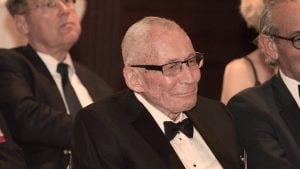Mr. Bandow, a nationally syndicated columnist, is a senior fellow at the Cato Institute and the author and editor of several books, including Tripwire: Korea and U.S. Foreign Policy in a Changed World.
The federal government was originally conceived as an institution with limited, enumerated powers. However, over time interest groups and politicians cooperated in vastly expanding federal powers. Indeed, Congress has routinely conferred political status upon influential interest groups, such as labor, by creating their own cabinet departments.
The Bureau of Labor was established in 1884, from which sprung the Department of Commerce and Labor in 1903, only to split into two separate departments in 1913. Today the Department of Labor runs a national unemployment insurance system, regulates employment hours and wages, offers a hand to unions under the guise of monitoring employee-employer negotiation, conducts training programs, and generally oversees the workplace.
It should come as no surprise that organized labor has sought a formal beachhead in government. After all, business enjoys manifold subsidies from the Department of Commerce, whose primary function is to enhance corporate profits. But even many private firms today see the federal government as a kind of negotiator-in-chief when it comes to other companies’ labor disputes. During the United Parcel Service strike, the Chamber of Commerce called on President Clinton to order the workers back to work and the company back to the negotiating table. Although the President declined to do so, he did pressure the parties to reach an agreement. Moreover, he, like his predecessors, had no principled objection to using his power, having ended the earlier strike against American Airlines as it began.
Here, as elsewhere, government has metastasized beyond any conceivably appropriate role. Labor relations are a private matter. Government should act only as impartial arbiter, preventing either side from using violence to achieve its ends and providing the framework for adjudicating disputes—are both sides living up to their contract? But questions as to whether workers join or are represented by a union, and what terms employees and employers agree on, should not be answered by government.
Of course, the Labor Department was not created out of a principled desire to solve problems. Rather, it was essentially a payoff to labor unions. The bias was most evident during the New Deal, though many of those laws live on. Losers are not just companies faced with government-backed unions, but workers who don’t want to support a union. Individual choice has never been seen as a virtue by government.
The Labor Department has not limited itself to regulating employment relations. It grabbed a growing piece of the welfare state when Washington’s crusades like the War on Poverty created new government programs hither and yon. Although the old Health, Education, and Welfare picked up the majority of welfare programs, Labor got ahold of a host of employment-related initiatives, ranging from job training to voluntarism.
It is perhaps here that Congress should start. The agency’s training programs have, in the main, proved to be abject failures. Scores of government efforts have had only minimal success in providing workers with more remunerative and permanent work. And that should come as no surprise, since government has no incentive to narrowly tailor public initiatives to individual needs. Congress should leave training to workers and employers.
Unemployment insurance discourages not only work, but also private savings to cushion a period of joblessness. Congress should abolish the program or, as second best, leave it with the states. One of the virtues of federalism is allowing different communities to handle problems like unemployment differently.
Congress should also roll back federal regulation of the labor market. The minimum wage destroys jobs, since it prices out of work anyone who lacks sufficient education, experience, and skills to earn the minimum. Were this not the case, the government could make everyone rich by imposing a minimum of $100 or $1,000 an hour. Similar in effect is the Davis-Bacon Act, which requires the payment of union-scale wages for federally funded construction projects.
Restrictions on overtime and other work conditions are equally misguided. Employees and employers should be free to bargain over the terms of their employment. Different workers are likely to prefer different packages of benefits; there is no reason for Washington to decide, say, the overtime pay rate, or under what circumstances companies can instead offer comp time.
Similarly, the government should not be in the business of promoting labor unions or aiding corporations. Early in its history Washington favored the latter; more recently it has leaned towards the former. But, again, federal regulation, though justified as helping working people, actually interferes with the right of employees to choose the employment conditions they prefer. At the same time, restrictive regulations bar workplace flexibility—which benefits employees and employers alike—and penalizes blameless companies for transgressing rules designed to give organized labor an unfair boost in representation elections. Congress should, among many other things, end exclusive representation by one union, restrictions on labor-management cooperation, and the requirement that firms hire union organizers as employees.
Especially important is statutory enforcement of the 1988 U.S. Supreme Court decision, Communications Workers of America v. Beck, which grants workers the right to a refund of any union dues used for political purposes. One of the first acts of the Clinton administration was to repeal federal rules requiring that unions give an accounting to their members. As a result, most labor unions today flout the law, collecting dues with the implicit aid of the federal government for use in partisan political campaigns.
Congress should also dismantle the Occupational Safety and Health Administration (OSHA). Despite imposing annual costs estimated to run between $11 billion and $34 billion on the economy (the agency’s nitpicking regulation is legendary), there is no evidence that OSHA has improved U.S. workplace safety. The rate of employee fatalities has been falling for six decades, and is affected more by insurance requirements and tort litigation than by OSHA. (After all, it is not good business for companies to end up with dead workers.) At the same time, there has been little drop in workplace injuries since the creation of OSHA. The most realistic assessment of the maximum benefit of OSHA regulation is about $4 billion, which falls somewhere between one-third and one-ninth of the cost imposed by the agency on the U.S. economy. Repeal, not reform, is warranted, leaving workplace safety constrained by a variety of more cost-effective mechanisms, including private lawsuits and market pressure.
Such tasks as collecting statistics and figuring the rate of inflation (Bureau of Labor Statistics), could be transferred to the Census Bureau. Oversight of private pensions (Pension Benefit Guarantee Corporation) could be shifted to the Treasury Department, with the agency stripped of its role as guarantor—which poses multibillion dollar liabilities for taxpayers—and focused instead on ensuring that private companies fulfill their contracts to former employees.
The federal government has grown dramatically and inexorably because politicians desiring to expand their power have joined with interest groups desiring to benefit from that expansion of political power. The Labor Department is an example of a government bureaucracy that should not exist: a wasteful amalgam of special-interest subsidies and officious government interference. This would be a good place for Congress to begin paring government back to its essentials.




